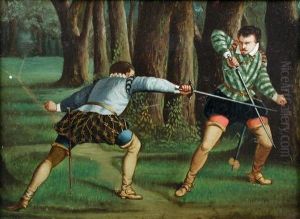Nestore Leoni Paintings
Nestore Leoni, born in 1862 and passing away in 1947, was an Italian artist whose work has garnered attention for its historical and cultural significance within the broader spectrum of European art. Leoni's career spanned a period of profound change in Italy, from the years of national unification through two World Wars, and his art reflects the evolving aesthetics and themes of these transformative times.
Leoni was trained in the classical tradition, which greatly influenced his early work. However, as his career progressed, he began to incorporate more modern elements into his art, blending traditional techniques with emerging styles of the late 19th and early 20th centuries. This synthesis allowed him to create works that were both accessible to a broad audience and respected by critics for their technical proficiency and innovative approach.
Throughout his career, Leoni showed a keen interest in landscapes and portraits, often imbuing them with a sense of realism and emotional depth that spoke to the viewer's own experiences and aspirations. His landscapes, in particular, were noted for their ability to capture the unique light and color of the Italian countryside, offering a window into the nation's soul. Meanwhile, his portraits were celebrated for their psychological insight and the skill with which he captured the essence of his subjects.
Leoni's contribution to Italian art is also marked by his involvement in various artistic circles and movements of his time, which helped to foster a sense of national identity through the visual arts. His work was exhibited widely in Italy and abroad, earning him recognition and awards that cemented his reputation as a key figure in the transition from traditional to modern art in Italy.
Despite his success, Nestore Leoni remains a somewhat enigmatic figure, with much of his life and work still subject to research and discovery. His legacy, however, is secure, resting on a body of work that continues to inspire admiration and study for its beauty, technical skill, and historical importance. Leoni's art captures the spirit of an Italy in flux, reflecting the challenges and triumphs of a nation seeking to redefine itself on the world stage while staying true to its rich cultural heritage.
